- April 14, 2022
- By Karen Shih ’09 And Lauren Brown
The runaway success of the university’s Do Good Challenge for the past 10 years has zero degrees of separation from Kevin Bacon.
It goes back to when Karen ’76 and husband Bruce Levenson called Robert Grimm, then director of the School of Public Policy‘s philanthropic and nonprofit program, to say their nephew was working with the actor—and he’d be happy to host a campus event. Grimm just needed to create one.
He, students and other faculty members, inspired by Bacon’s SixDegrees nonprofit connecting people and good causes, developed a competition encouraging Terp teams to create, volunteer for, advocate or raise money over eight weeks for a social need.
Bacon soon donned a Fear the Turtle T-shirt to make a one-minute promotional video and agreed to help judge the six finalists for the inaugural Do Good Challenge in April 2012.
“We were worried no one would show up,” Grimm recalled. “We thought it would be the only one we put on.”
Instead, 100 teams participated in this social impact-focused mashup of “American Idol” and “Shark Tank.” Nearly 700 cheering students turned out to watch the finals, $5,000 was awarded to expand the fledgling Food Recovery Network’s efforts, and 10 years later, the event is the center of a suite of efforts encouraging students to make a difference.
Mini grants, courses, “accelerator” fellowships, a graduate certificate program in nonprofit management, paid internships and coaching have built a pipeline—now based in UMD’s Do Good Institute—to support students’ projects and ventures. “These aren’t future leaders,” Grimm said. “They are leaders now, changing the world today.”
Students have taken on causes including cancer awareness, poverty, veterans with disabilities and sexual assault. Like the university’s Do Good initiatives, the nonprofits they launched have also evolved. Maryland Today spoke to seven past participants about where they—and their Challenge efforts—are now.
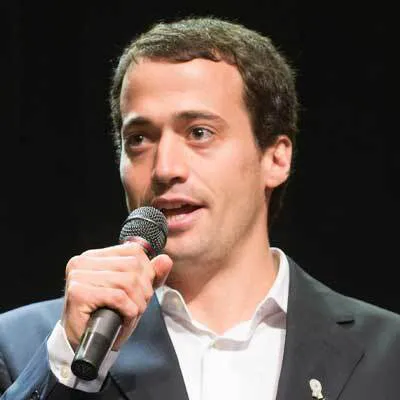
Juan Bellocq M.P.P. ’13 and Fernando Sartiel M.P.P. ’12
Fundacion Microjusticia Argentina
To Buenos Aires lawyer Juan Bellocq, working for a new nonprofit he’d heard was building houses for people living in slums sounded like more rewarding work than his job supporting the wealthy. Too bad that he didn’t have house-building skills.
What he did have was legal expertise, which inspired his 2010 creation of Fundacion Microjusticia Argentina, which provides free legal support to vulnerable communities, especially women. He soon earned a Fulbright award to study nonprofit management at UMD to bolster his fledgling volunteer network.
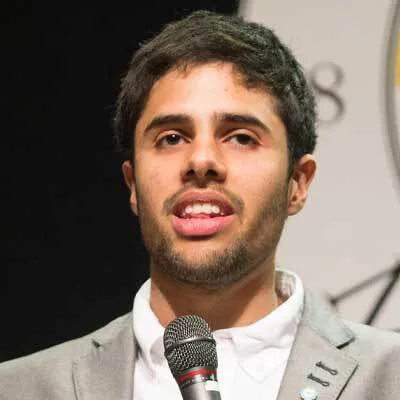
There, he and new pal (and soon, fellow co-founder) Fernando Sartiel entered the 2013 Do Good Challenge with a grassroots fundraising effort for Microjusticia.
“Winning the challenge enabled us to get international recognition,” he said. That helped professionalize the organization and secure more donations, including a $180,000 grant from the United Nations’ Democracy Fund a few years later.
Microjusticia has since expanded to four provinces, and Bellocq has stepped away. He’s now legal adviser for the federal Social Security Agency and managing director and founder of Fundación IBAPP, a conservation nonprofit in Patagonia.
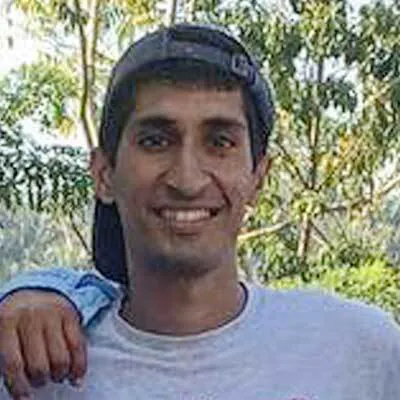
Students Helping Honduras
Sagar Doshi ’15 and Anderson Sloan ’14
Grilled-cheese sandwich sales were the sizzling secret behind the success of UMD’s chapter of Students Helping Honduras in the 2014 Do Good Challenge.
Sagar Doshi and Anderson Sloan presented how the group quickly brought in an astonishing $19,000 through humble bake sales, date auctions and the sandwich stunt. Buying one sandwich, they said, was like buying one brick for a new school.
“We tried to make it tangible of what a dollar really meant,” Doshi recalled.
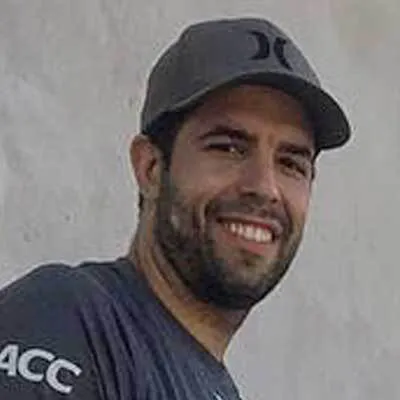
And with the group so close to raising the $25,000 needed for one school, he said, the judges had to award SHS the $6,000 grand prize.
UMD soon became the nonprofit’s top chapter for fundraising and participation; the number of Terps heading to Honduras to work with locals on construction jumped from 20 in 2014 to 117 the next year.
Doshi and Sloan continue to support SHS, now as co-founders and executive directors of One Thousand Schools, which recruits young professionals for service trips to Honduras. Corporate matching gifts, he said, can do more than bake sales.
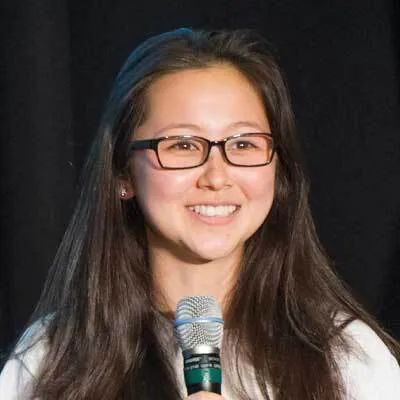
Linda Powers ’15
Miles for Smiles
We might take for granted a toothbrush, tube of Colgate and regular dental appointments. But on three mission trips to Honduras and Panama with other Terps, Linda Powers saw firsthand that oral care isn’t always so accessible.
In fact, it might require a few miles of walking. That “life-changing experience,” she said, inspired her to start a 5K run/walk called Miles for Smiles to raise awareness of that difficulty and raise money for trips and supplies for UMD’s chapter of the Dental Global Brigade.
Powers, who volunteered with her dentist dad at free dental clinics for people in need, shared the success of Miles for Smiles at the 2015 Do Good Challenge, winning the grand prize and audience choice award.
She’s since graduated from dental school and is now in residency for a specialty, yet remains grateful for her UMD teams and still supports Miles for Smiles, whether recruiting dental-school peers to volunteer or speaking to the group as recently as April.
“I wouldn't be where I am today and I wouldn't be the person I am today had it not been for team M4S and the Do Good Challenge,” Powers said.
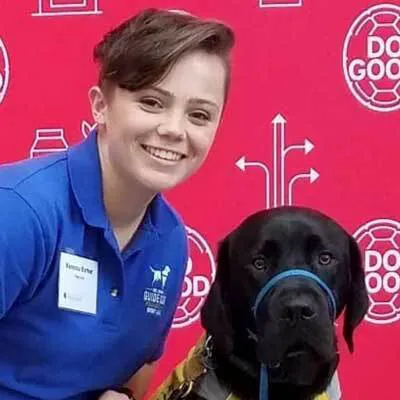
Vanessa Barker ’20 and Cate Law ’19
Pawsible Inc.
It was a $500 mini-grant from the Do Good Institute that made “pawsible” Vanessa Barker’s initial goal of providing pet food and supplies to UMD students raising service dog puppies.
“The college experience is really amazing for these dogs, because they get to have all these experiences around campus that a working adult would have to try really hard to create,” said Barker. “But some of our peers were going hungry so they could buy dog food,” since puppy raisers assume all financial responsibility for the dogs for up to two years.
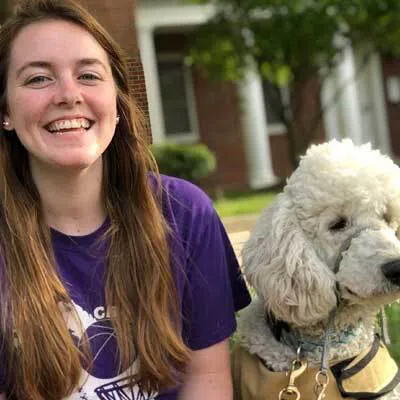
While her efforts with friend Cate Law didn’t win the 2019 Challenge, additional Do Good grants and Barker’s time as a Do Good Accelerator fellow put Pawsible on the path to become an official nonprofit in 2020—just in time to meet the growing financial need that emerged during the pandemic. Now, Pawsible’s reach extends across the country, paying for vet bills, toys and other puppy-raising essentials to ensure people with disabilities continue to get the tail-wagging support they need.
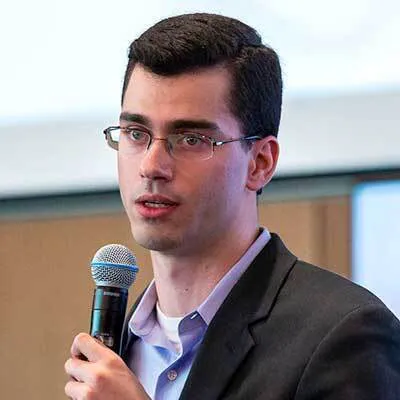
Matthew Hollister ’18
The James Hollister Wellness Foundation
Over the last six years, Matthew Hollister has saved lives in Ghana, Bolivia and Honduras, thanks to more than $90,000 worth of medicine his foundation has donated to clinics overseas.
It’s a silver lining after his father died from brain cancer when Hollister was a UMD freshman. His family was left with thousands of dollars of medication that due to liability issues had to be thrown away.
“That waste didn’t sit very well with me,” said Hollister. That’s when he created the James Hollister Wellness Foundation, named for his father, to collect unused medicine from hospitals, pharmacies and hospices to send to countries experiencing drug shortages.
The foundation received its first donation thanks to a mentor’s connection during the 2015 Do Good Challenge—and the following year, Hollister won the grand prize and audience choice award, walking away with $6,500.
“With the money and the connections we were able to expand at a breakneck pace,” he said. Today, the foundation has served more than 50,000 people, and Hollister is developing a for-profit ecommerce platform for pharmacies to further reduce drug waste.
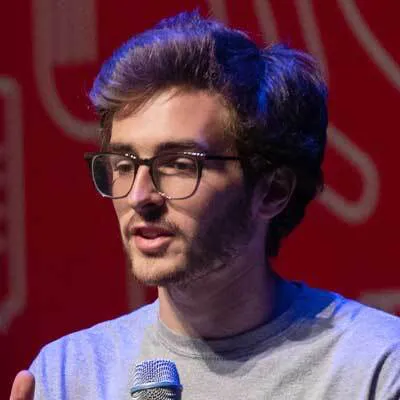
Anthony Sartori ’18
Evolving Minds
For Anthony Sartori, competing in the 2018 Do Good Challenge was the first step in his quest to improve how colleges and companies approach mental health for students and employees. After donating half the prize money to UMD’s Department of Resident Life for mental health first-aid training, he dove into Do Good Institute resources, joining the Scale Your Impact program and taking Grimm’s fundraising class to develop his new nonprofit, Evolving Minds.
“I used all of his insight and teachings to transform a campaign and immediately raised $15,000,” said Sartori.
Today, he works with companies like MOM’s Organic Market to improve employee well-being, connect workers with the organization’s mission and train managers to deliver a mental health curriculum. He also offers resilience training, especially for educators experiencing stress and anxiety, and leadership training to UMD students.
“We’re working to redefine leadership as vulnerability and caring for humankind and the planet,” he said.
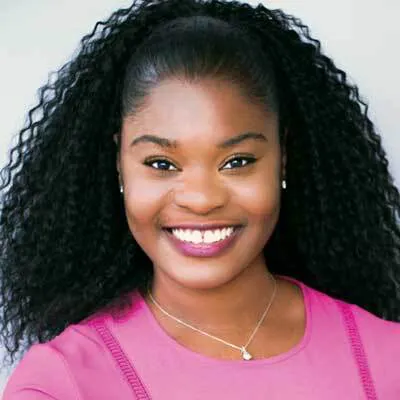
Audrey Awasom ’18
Noble Uprising
Audrey Awasom knew it was time to journey into entrepreneurship when she found herself doing more work on her passion project than her homework. “I wanted to know how I could create an actual organization and to scale the impact of the project.”
Enter the Do Good Institute. Using its grants, mentors and classes, she founded Noble Uprising, which provides food and sanitary items, basic literacy and soft skills education, and technical training to help women experiencing poverty get jobs and transform their lives. Her organization has delivered more than 9,000 care package items, served 87 women and a partnership with the Prince George’s County Family Justice Center will expand its reach to hundreds of families.
The institute’s Impact Interns program has been a particular boon to Awasom as Noble Uprising has grown. Their research informed her 10-year growth plan and helped her expand program-ming, such as creating a network of food pantries women can access conveniently, without barriers like applications or appointments.
“We’re able to create programs that meet the needs of individuals where they are,” she said.
Topics
Campus & CommunityUnits
School of Public Policy